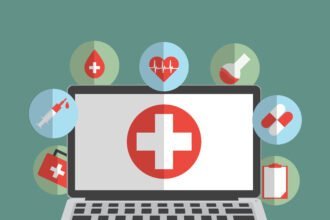The healthcare system is a very important part of the economy. The Bureau of Labor Statistics reports that around 9.3% of the workforce is in healthcare.
Unfortunately, not all healthcare professionals get the right education. We need to do everything possible to improve the education system to make sure future healthcare professionals are able to do their jobs well.
A 2022 study from the University of Miami and several other American colleges talked about this topic.
“The education of health professionals is currently at a crucial moment for potential change. After 10 years of innovations, an example of which is massive open online courses (free online courses available for anyone to enrol), the COVID-19 pandemic disrupted education systems everywhere, increased the use of online technologies, led to major institutional rearrangements to accommodate teaching models that combine online and in-person teaching, and revealed pre-existing inequalities in access to educational resources within and between countries. By starting economic and social crises, the pandemic has generated many disruptions that will probably have long-term implications for both education and health-care systems. As a subsystem between these two systems, but related to both, health-professional education can be a leader in innovation to improve the integration of emerging competencies and technologies. This Health Policy examines important developments in the past 10 years to assess potential progress and issues with the education of health professionals after the COVID-19 pandemic,” the authors write.
Embarking on a public health education journey offers an opportunity to make a meaningful impact on community well-being and health systems. Whether you’re just starting or looking to enhance your skills, excelling in this field requires a mix of strategic planning and dedication. From choosing the right program to staying updated on industry trends, each step plays a crucial role in shaping your success.
Public health education can be demanding, but with the right approach, it becomes a rewarding experience. This guide provides practical tips to help you navigate your public health studies effectively. By focusing on these areas, you’ll not only enhance your educational experience but also set yourself up for a successful career in public health.
Master Time Management Skills
Effective time management is essential for success in public health education. Developing a study schedule helps manage coursework, assignments, and exams efficiently. Start by outlining all deadlines and exam dates, then break down tasks into manageable segments. Allocate specific times each day for studying, and stick to this routine to ensure consistent progress.
Prioritization is also key. Identify tasks based on their urgency and importance. For example, if a research paper is due soon, focus on completing it before starting on less pressing assignments. Use tools like calendars or planner apps to keep track of tasks and deadlines. Regularly review and adjust the schedule as needed to accommodate any changes or unexpected events.
Choosing the Right Public Health Program
Selecting the right public health program is crucial for excelling in the field. If opting for an online bachelors in public health, consider how the program aligns with your personal goals and lifestyle. Look for programs that offer flexibility and are designed to cater to various schedules, particularly if balancing work or other responsibilities. Evaluate the curriculum to ensure it covers essential areas such as epidemiology, biostatistics, health policy, and environmental health. Programs should also provide opportunities for practical experience through internships or fieldwork, which are vital for applying theoretical knowledge.
Another key factor is accreditation. Ensure that the program is accredited by a recognized body, which can impact the quality of education and future career prospects. Additionally, check if the program offers resources such as academic advising, career counseling, and technical support to aid in completing the degree successfully. An online program with these features can offer a supportive learning environment essential for achieving academic and professional goals.
Engage Actively in Coursework
Active engagement in coursework enhances learning and retention. For online courses, participate in discussion forums and virtual class sessions to interact with instructors and peers. Asking questions and contributing to discussions can deepen understanding of the material and provide different perspectives.
Completing all assigned readings and activities is also important. These tasks are designed to reinforce key concepts and provide a foundation for more advanced topics. Regularly reviewing course materials and taking notes can help with retention and make exam preparation more manageable. Actively engaging with the content and participating in academic activities lead to a more thorough grasp of public health concepts.
Utilize Available Resources
Maximizing available resources can significantly impact academic success. Utilize university libraries and online databases for accessing textbooks, academic journals, and research articles. These resources provide valuable information and support for assignments and research projects.
Don’t hesitate to seek help from professors and academic advisors. They can offer guidance on coursework, career advice, and strategies for overcoming academic challenges. Additionally, forming or joining study groups can facilitate collaborative learning and provide support from peers who may share similar academic goals.
Apply Theoretical Knowledge Practically
Applying theoretical knowledge to practical situations is crucial in public health education. Engage in internships or volunteer opportunities that allow for hands-on experience in the field. These experiences provide insights into real-world applications of classroom concepts and help build practical skills.
Internships and volunteer work can also offer networking opportunities and help build a professional portfolio. These experiences allow students to work on public health projects, collaborate with professionals, and gain exposure to various aspects of the field. Practical experience complements academic learning and is essential for understanding how public health theories are implemented in practice.
Stay Updated on Public Health Trends
Staying current with public health trends is essential for anyone pursuing a career in this field. Public health is a dynamic field that evolves rapidly due to new research, emerging health issues, and changing policies. To keep up with these changes, follow reputable sources of information, such as public health journals, industry news websites, and government health agencies.
Regularly read articles and reports from organizations like the World Health Organization (WHO) and the Centers for Disease Control and Prevention (CDC). These sources provide updates on global and national health trends, research findings, and policy changes. Attending webinars, workshops, and conferences is also beneficial. These events often feature experts discussing the latest developments in public health and provide networking opportunities with professionals in the field.
Develop Strong Research Skills
Strong research skills are crucial in public health education and practice. Effective research involves not only gathering information but also analyzing and interpreting data to make informed decisions. Start by learning how to conduct thorough literature reviews, using academic databases and libraries to find relevant studies and data.
Developing the ability to critically evaluate sources is essential. Not all information is equally reliable or relevant, so it is important to assess the credibility of sources and the quality of the research. Familiarize yourself with various research methodologies and statistical techniques commonly used in public health research. This knowledge helps in designing studies, analyzing data, and drawing accurate conclusions.
Enhance Communication Skills
Effective communication is a key component of public health education and practice. Public health professionals must convey complex information clearly to diverse audiences, including policymakers, community members, and colleagues. Develop strong written and verbal communication skills to present data, research findings, and health messages effectively.
Work on writing skills by practicing report writing, creating presentations, and drafting policy briefs. Focus on clarity, coherence, and accuracy. For verbal communication, practice presenting information in a way that is engaging and accessible. Public speaking opportunities, such as presenting at academic conferences or participating in community outreach programs, can help build confidence and proficiency.
Build a Professional Network
Building a professional network is important for career development in public health. Networking provides opportunities to connect with peers, mentors, and professionals who can offer guidance, support, and job opportunities. Start by attending public health events, joining professional organizations, and participating in online forums related to public health.
Connect with alumni from your program and reach out to professionals in the field through platforms like LinkedIn. Engaging with these connections can provide valuable insights into career paths, job market trends, and industry best practices. Participating in public health associations and committees can also enhance visibility and open doors to new opportunities.
Excelling in public health education involves a combination of strategic planning, active engagement, and continuous learning. Choosing the right program, mastering time management, and engaging with coursework lay the foundation for success. Utilizing available resources, applying theoretical knowledge practically, and staying updated on industry trends further enhance learning and professional development. Developing strong research and communication skills, building a professional network, and focusing on self-care is crucial for a balanced and successful educational experience. By following these tips, students can effectively navigate their public health education journey and prepare for a rewarding career in the field.








